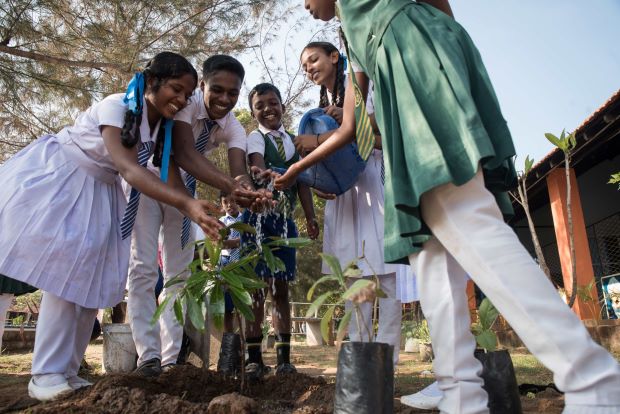Every year, 12 million hectares of land are lost to degradation, impacting food and water supplies across the globe. Land degradation hits hardest on those least equipped to cope: rural communities, smallholder farmers, and the poor. Over the years, Sri Lanka has seen a sharp rise in land degradation, leading to increased poverty, reduced productivity, and biodiversity loss.
The effects of climate change are making its mark on our land with more frequent droughts, heatwaves, and wildfires. As one of the world’s most climate-vulnerable countries, Sri Lanka faces annual drought losses of 5.2 billion rupees – nearly 32 million US Dollars. Deforestation and soil degradation further feed climate change by damaging forests, drylands and grasslands, which are major stores of planet-warming carbon molecules. From global warming to the biosphere and deforestation, from pollutants and plastic to nitrogen cycles and freshwater, the 2023 update on the planetary boundaries outlines that six of the nine boundaries have been crossed, indicating serious risks to the people and ecosystems.[1]
Combined, these issues can have devastating effects on people and the planet, particularly threatening the human right to life, health, food, water and a healthy environment. This is why nature and ecosystem restoration are at the heart of UNDP Sri Lanka’s work across the island. UNDP in Sri Lanka in close partnership with the Government of Sri Lanka are working towards catalyzing a transition towards green development—nature-based human development.
UNDP’s Biodiversity Finance Initiative (BIOFIN) looks at sustaining and conserving biodiversity and ecosystems, promoting sustainable investments in nature and supporting the country to meet its conservation commitments, particularly by transforming key economic sectors like tourism. The Small Grants Program provides financial and technical support to projects that conserve and restore the environment while enhancing people’s well-being and livelihoods in the Colombo, Knuckles and Mannar-Jaffna landscapes. On the renewable energy front, green technologies and renewable energy technologies have been localized among marginalized farmer demographics in the dry zone. Sustainable biomass energy production and modern bioenergy technologies as a substitute for imported fossil fuels to reduce Sri Lanka’s carbon footprint have been piloted. Interventions to accelerate solar energy deployment, e-mobility, and comprehensive waste management solutions are being explored. The Green Climate Fund financed, Climate Resilient Integrated Water Management Project (CRIWMP) implemented by the Government of Sri Lanka together with UNDP Sri Lanka, offers a blueprint for reviving Sri Lanka’s cascade system for water resilience, incorporating modern technologies and climate-resilient infrastructure, climate information services and agro-met advisories to create a more sustainable dry-zone eco-system and enhance climate resilience. Underpinning these, UNDP assists the GOSL to create an enabling policy environment for climate and environmental action, which strengthens and catalyzes progress towards the adoption of more diverse nature-based solutions, low-carbon development pathways and sustainable climate action, and paving the way to securing innovative financing solutions for the country.
The beauty of ecosystem restoration is that it conveys a message of action and hope and can happen at any scale. This World Environment Day, join the action to unlock a balance between nature and development.
-UNDP/Sri Lanka



Comments are closed, but trackbacks and pingbacks are open.